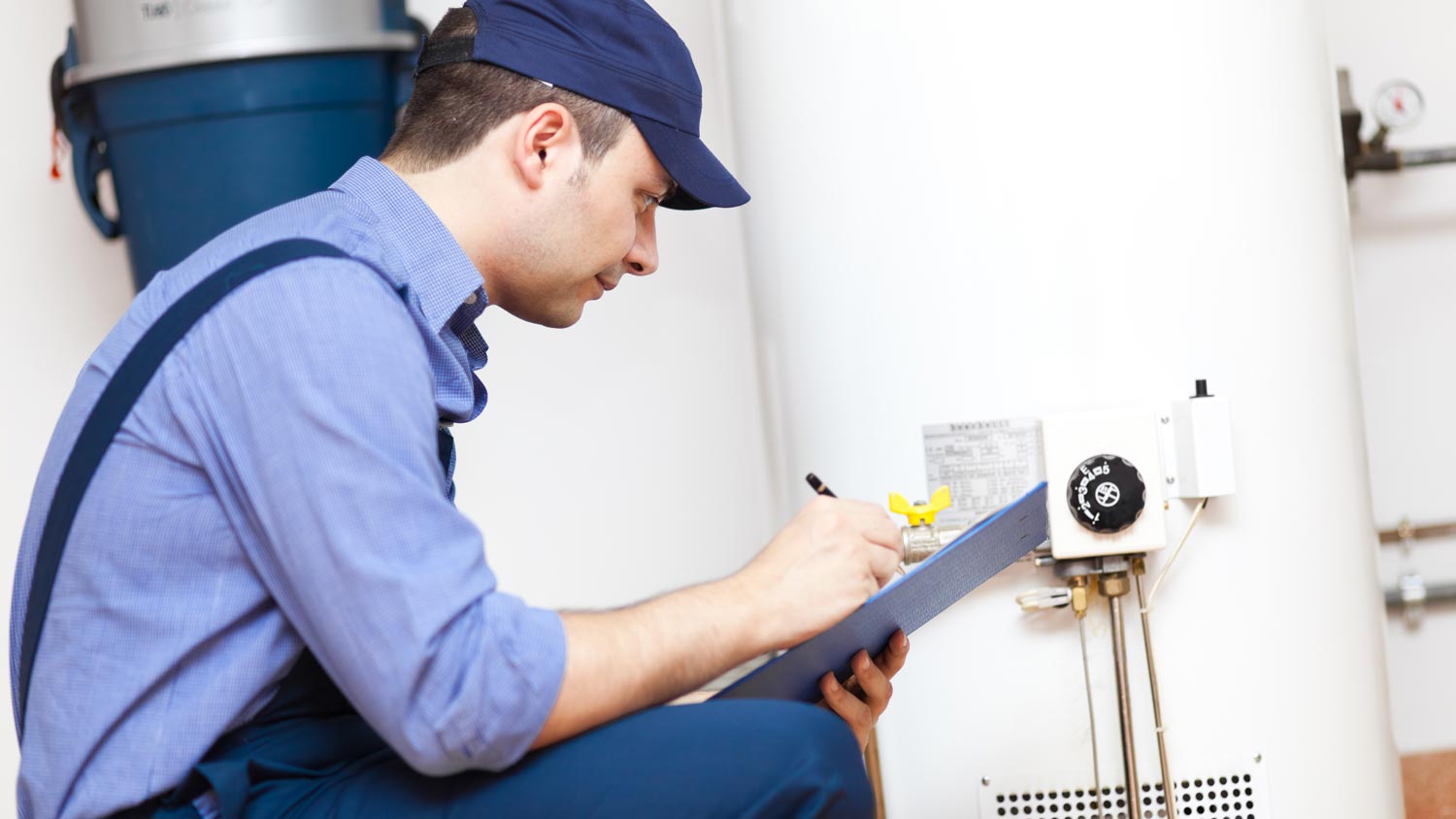7 Common Water Heater Problems and the Solutions
Say goodbye to cold showers


Sediment buildup can lead to water heater noises, odors, and discoloration.
You may need a bigger water tank if your household’s water usage has increased.
Schedule an annual inspection with a pro to prolong your water heater's lifespan.
A broken water heater can mean you’re forced to take some very uncomfortable showers every morning. Sometimes, the solution is simple enough that most homeowners can fix it themselves, while other water heater problems are best left to the pros. Use this list of common water heater issues and solutions to troubleshoot your water heater and determine whether it's time to call in a professional.
1. No Hot Water or Undesirable Temperature
If you don’t have any hot water, your water tank might not be big enough to accommodate your household’s water demands—that’s one of the major signs you need a new water heater. However, it could also be due to problems with some water heater components like the thermostat or heating element, or sediment buildup in the tank.
Solution
First, consider whether your household’s water usage has been higher than usual. The fix for this is to either reduce your water usage or invest in a larger tank.
But if your usage hasn’t increased, check the thermostat. If it’s too low, raise the temperature to see if that works. If that’s not the problem, then inspect the heating element for any damage or malfunctions. If you notice something amiss, contact a pro to further investigate.
Finally, consider draining your water tank to remove sediment buildup, which can affect the water temperature. Ideally, you should drain the tank at least once per year for preventative hot water heater maintenance.
2. Water Heater Is Leaking

If you notice water pooling around the base of your water heater or any dampness or discoloration on the surrounding walls, your water heater is likely leaking. You’ll need to first identify the source of the leak, which will determine how to fix it.
Solution
Check the pressure relief valve, typically located on the top or side of the water heater tank, for any leaks. Make sure the valve is completely closed. If it’s closed and you still notice water dripping from the valve, you’ll likely need to replace the valve with a new one.
If it’s not the pressure relief valve, check the drain valve located at the very bottom of the water heater tank. Make sure it’s tightly closed—if it’s even a little bit loose, it can create leaks over time. If it’s tightly closed but still leaking, you’ll need a new one.
If neither of the valves is the culprit, inspect the entire tank for rust, corrosion, or water stains on the tank’s surface. If you identify significant damage, it may be time for a new water heater, but it’s best to consult a pro for their recommendation.
3. Water Discoloration
Brown or muddy water means there's rust or sediment buildup in the tank, which can affect your water heater's performance.
Solution
Turn off the water heater and connect a hose to the drain valve located at the bottom of the tank. Open the drain valve and let the water run through the hose to remove any sediment. When the water stops running, remove the hose and close the valve. Then refill the tank.
If the water is still discolored, check the anode rod, a metal rod hanging inside the tank. If the rod is thinner than it once was or covered in deposits, you probably need to replace it.
4. Noises Coming From the Water Heater
Sometimes water heaters rumble, pop, or hiss, which might be due to sediment buildup at the bottom of the tank or a problem with the heating element.
Solution
Turn off the water heater and inspect the heating element, which is usually located inside the tank underneath a metal cover plate. Look for any signs of wear or damage. If you notice anything unusual, call a pro to properly diagnose and fix the problem.
If your heating element seems fine, try draining the tank to remove sediment buildup. First, turn off the water heater, then connect a hose to the drain valve. Open the drain valve and let the water run through the hose to remove any sediment.
5. Strange Odor
If your water smells like rotten eggs, you probably have bacteria in the tank. Bacteria can react with the metal of the anode rod and create an odorous hydrogen sulfide gas. But if you notice the smell even when the water isn't running, you might have a gas leak. If that’s the case, you should immediately leave the house, take all people and pets with you, and call 911 since this can be lethal.
Solution
To clean the bacteria, turn off the water heater then drain the tank by connecting a hose to the drain valve. Then fill the tank with a solution of hydrogen peroxide and water. You should add about 8 ounces of 3% hydrogen peroxide for every gallon of water. Let it sit for several hours then drain the tank and refill it with fresh water.
6. Low Hot Water Pressure

Corroded plumbing, obstructions, and sediment buildup can all lead to low hot water pressure.
Solution
Turn off the water heater, connect a hose to the drain valve, then drain the water to remove sediment. If this doesn't fix the problem, inspect your water pipes for any signs of corrosion or damage. Depending on the pipes' locations, you might need to call a local plumber to help.
7. Damaged Pressure Relief Valve
Over time, the pressure relief valve, which you’ll find on the top or side of the water heater tank, can become faulty. You’ll notice a small leak coming from the valve.
Solution
To replace an old pressure relief valve that is leaking, turn off the power to the water heater, and turn off the cold water supply to the water heater tank. To be extra safe, you can also shut off the water to your home entirely. You’ll then need to drain the water heater into a bucket beneath the valve.
Unscrew the water heater pressure relief valve and discharge tube with a wrench, and replace it with the new valve, which you can purchase at a hardware store. Follow the instructions that accompany the valve to ensure proper installation. Turn the water back on and slowly open the cold water supply to allow the water heater to refill. Watch to ensure there are no continued leaks.
Note: If you have a newer pressure relief valve that is leaking, it’s possible that it was installed incorrectly. In this case, you probably don’t need to purchase a new valve, but simply reinstall the existing valve—or call in a pro if you were the one to initially install it incorrectly.
Should You Contact a Pro About Your Water Heater?
Water heaters involve electricity, plumbing, and sometimes gas, so it's best to hire a water heater contractor near you to address any major issues. They'll have the expertise and equipment required to safely fix your water heater or replace it with a new one.
The cost to repair a water heater ranges from $225 to $980, while the cost to replace a water heater averages between $880 and $1,800.
If you need water heater repair after hours, try waiting until the next day. Emergency plumbers can cost up to three times as much when you call them in the evening, on weekends, or during holidays.
How to Prevent Common Water Heater Problems
Here are a few steps you can take to prolong your water heater's lifespan.
Schedule annual maintenance with a pro to check for and tackle any issues before they become too costly.
Drain and flush the water tank annually to remove sediment.
Replace the anode rod every 1 to 3 years to prevent rust and bacteria in the tank.
Keep the water heater set to less than 120 degrees Fahrenheit to prevent overheating and wear on the system.
Regularly inspect the tank and all valves for any leaks, malfunctions, or signs of damage.
If your water heater has any filters, clean them every 3 to 6 months to remove sediment and other buildup.
Frequently Asked Questions
Signs that your water heater needs replacing include rust or corrosion on the tank, persistent leaks, inconsistent heating, strange noises coming from the heater, decreased efficiency, and visible damage. Water heaters over 10 years old may also need to be replaced. However, in some cases, these issues can be fixed with a repair rather than a replacement, so make sure to consult a pro before investing in a new water heater.
Signs that your water heater may explode include rust-colored water coming from hot water taps, the smell of sulfur or rotten eggs coming from the water, shaking or rumbling in the tank, and a leaky temperature and pressure valve. If the water heater feels excessively hot to the touch, it could also indicate the prospect of an explosion. If you suspect your water heater might explode, call a pro immediately to address the problem.
Yes, you can call a pro to inspect your water heater. A qualified professional will know how to inspect for and troubleshoot potential problems safely. They can also provide professional recommendations for whether you should repair the water heater or invest in a new one. Before hiring a pro, reach out to a few different candidates so you can find the best fit and price.





- Top Causes of Water Heater Leaks and What to Do When It Leaks
- Solutions If Your Water Heater Is Leaking from the Top
- 9 Tips for Preventative Maintenance on a Hot Water Heater
- 6 Signs Your Water Heater Might Explode
- Water Heater Not Draining: Top Reasons
- 14 Reasons Your Water Is Only Lukewarm
- Overview of Water Heater Components
- How Long Does It Take to Drain a Water Heater?
- Water Heater Making Noises? Main Causes & What to Do
- 3 Reasons Your Hot Water Tank Relief Valve is Leaking










